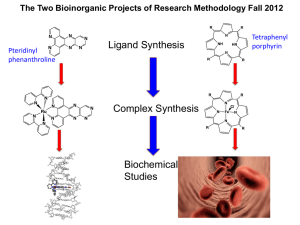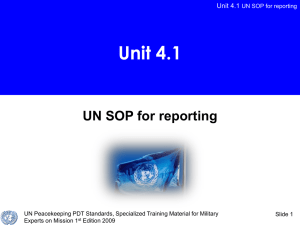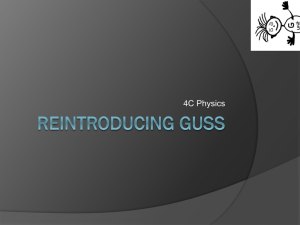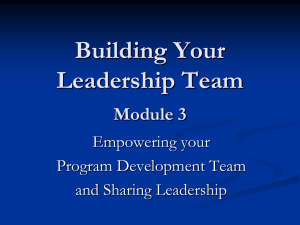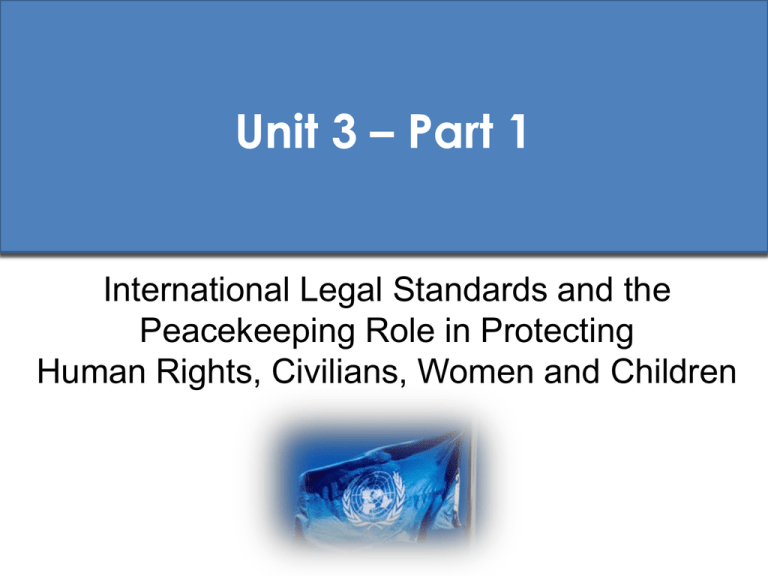
Unit 3 – Part 1
International Legal Standards and the
Peacekeeping Role in Protecting
Human Rights, Civilians, Women and Children
Why is this important for me?
UN Pre-Deployment Training (PDT) Standards
Core PDT Materials 1st Ed. 2009
Why is this important for me?
As peacekeeping personnel you are expected to…
• Promote and protect human rights
• Protect children from violence, including from
illegal recruitment into armed forces as child
soldiers
• Promote gender equality, involve women in peace
and security activities, and protect women and
children from sexual violence in conflict
UN Pre-Deployment Training (PDT) Standards
Core PDT Materials 1st Ed. 2009
You are a Role Model
• You are an ambassador of the United Nations
• Everything you do must stand up to the highest
standards of behaviour and integrity
• Peacekeeping
personnel are not
allowed to violate
human rights or
international
humanitarian law in
any way
UN Pre-Deployment Training (PDT) Standards
Core PDT Materials 1st Ed. 2009
Part 1a: International Law
Applicable to PKOs
UN Pre-Deployment Training (PDT) Standards
Core PDT Materials 1st Ed. 2009
Learning Outcomes
On completion of Unit 3 – Part 1a, participants will be
able to:
1. List the essential rules of International
Humanitarian Law
2. Define and give examples of human rights
protected under international law
3. Identify who is protected by, and who is bound by
international human rights law and international
humanitarian law
UN Pre-Deployment Training (PDT) Standards
Core PDT Materials 1st Ed. 2009
International
Humanitarian Law (IHL)...
• Is law that applies in times of armed conflict
• Aims to limit the negative impact of armed
conflict, especially on civilians
• Protects persons who are not (or are no longer)
participating in the hostilities
• Also restricts the means and methods of warfare
UN Pre-Deployment Training (PDT) Standards
Core PDT Materials 1st Ed. 2009
Essential Rules of IHL
1. Civilian targets cannot be attacked. Attacks only
against military objectives.
2. Civilians and anyone no longer taking part in
hostilities must be respected and treated
humanely.
3. Anyone who surrenders or stops fighting (e.g.,
wounded) cannot be killed
4. Torture is prohibited at all times and in all
circumstances
UN Pre-Deployment Training (PDT) Standards
Core PDT Materials 1st Ed. 2009
Essential Rules of IHL
5. Captured combatants and civilians must be
respected and protected.
6. It’s forbidden to use weapons or methods of
warfare that are likely to cause excessive injury
or unnecessary suffering.
7. Wounded and sick must be collected and cared
for.
UN Pre-Deployment Training (PDT) Standards
Core PDT Materials 1st Ed. 2009
Essential Rules of IHL
8. Medical personnel and medical establishments,
transports and equipment must be respected
and protected.
9. The Red Cross and Red Crescent emblems are
signs of protection and must be respected.
UN Pre-Deployment Training (PDT) Standards
Core PDT Materials 1st Ed. 2009
International Humanitarian Law...
• Imposes obligations to ensure respect for the
rules of IHL
• Requires the prevention and prosecution of war
crimes, such as attacking civilians, recruiting
children as soldiers, torturing prisoners, and
sexual violence
UN Pre-Deployment Training (PDT) Standards
Core PDT Materials 1st Ed. 2009
Who is Bound by International
Humanitarian Law?
• States and organized groups are bound by
international humanitarian law.
• The rules and principles of international
humanitarian law also apply to UN
peacekeeping forces.
• UN military personnel who violate international
humanitarian law are subject to prosecution in
their national courts.
UN Pre-Deployment Training (PDT) Standards
Core PDT Materials 1st Ed. 2009
How Do We Define Human Rights?
• Human rights apply in both war and peace to all
human beings
• Human rights are universal
• No one can take away a person’s human rights
• Human rights are interdependent and equally
important
• Human rights are legal and internationally
guaranteed
UN Pre-Deployment Training (PDT) Standards
Core PDT Materials 1st Ed. 2009
Application of International
Human Rights Law
•
Certain principles and rules (e.g. prohibition of
torture or right to a fair trial) apply to all persons
in all situations
•
Others human rights apply to those States
which have ratified treaties
•
All UN entities must promote and protect
human rights
•
UN peacekeeping should be conducted in full
respect of international human rights law
UN Pre-Deployment Training (PDT) Standards
Core PDT Materials 1st Ed. 2009
Refugee Law &
Guiding Principles on IDPs
•
International refugee law guarantees human
rights of refugees and spells out obligations of
States to protect refugees living in their
territory.
UN Pre-Deployment Training (PDT) Standards
Core PDT Materials 1st Ed. 2009
Part 1b: Human Rights
Protection in UN PKOs
UN Pre-Deployment Training (PDT) Standards
Core PDT Materials 1st Ed. 2009
Learning Outcomes
On completion of Unit 3 – Part 1b, participants will
be able to:
1. Recognize and identify human rights violations or
abuses that occur in the conflict or post-conflict
mission environment
2. Discuss UN policies on human rights that are
relevant to peacekeeping settings
3. Describe the practical relevance of human rights
to their work and ways to promote and protect
human rights through their tasks
UN Pre-Deployment Training (PDT) Standards
Core PDT Materials 1st Ed. 2009
Learning Outcomes
continued...
4. Explain the importance of coordinating human
rights-related actions with the mission’s human
rights component
UN Pre-Deployment Training (PDT) Standards
Core PDT Materials 1st Ed. 2009
Human Rights Protection in
Peacekeeping Operations
•
Multidimensional peace operations include
human rights as part of mandate and structure
•
Peacekeeping leadership need to be aware of
UN policies on human rights in peacekeeping
•
Peacekeeping personnel & UN organizations
must be able to recognize human rights
violations and abuses and respond
appropriately
UN Pre-Deployment Training (PDT) Standards
Core PDT Materials 1st Ed. 2009
UN Position on Human Rights in
Peaces Processes
•
Development, security and human rights are
mutually dependent on each other
•
Human rights are a key element of all peace
and security activities
•
UN will not endorse, support or recognize
amnesties for war crimes or grave violations of
human rights or international humanitarian law
UN Pre-Deployment Training (PDT) Standards
Core PDT Materials 1st Ed. 2009
UN Policy on Human Rights in
Integrated Missions
•
Human rights are a concern that cuts across all
components of an integrated mission, and
therefore must be fully integrated into such UN
peacekeeping operations
•
SRSG shall have a human rights adviser who is
also the head of the human rights component
of the mission, is the rep of the OHCHR, and
on the UNCT
UN Pre-Deployment Training (PDT) Standards
Core PDT Materials 1st Ed. 2009
Applying Human Rights in
Peacekeeping
•
Human rights as a common standard of
conduct and achievement
•
Peacekeeping must be conducted in full
respect for the principles, norms and spirit of
the human rights conventions
•
Both UN personnel and host government must
respect human rights principles and norms
UN Pre-Deployment Training (PDT) Standards
Core PDT Materials 1st Ed. 2009
If Human Rights Violations
Are Identified...
What Peacekeepers Can Do
Note the facts
Immediately report the violations
Take action, in keeping with the mandate, your
functions and based on the situation
Coordinate with human rights component
Follow the situation
UN Pre-Deployment Training (PDT) Standards
Core PDT Materials 1st Ed. 2009
Core Functions of
Human Rights Component
• Monitoring & Investigation of HR
violations & abuses
• Producing Internal & Public Reports
• Advocacy & Intervention
• Strengthening capacity of local actors
• Coordination and mainstreaming of
HRs in PKO, UNCT and Humanitarian
Country Team
Protection
GOAL
Empowerment
Other Mission Components
Contributing to Human Rights
• Rule of Law / Judicial
• Corrections
• Security Sector
Reform
• Gender Advisor
• Civil Affairs
• Child Protection
• Electoral
• Humanitarian Affairs
• DDR
• Political Affairs
• SRSG’s Office
UN Pre-Deployment Training (PDT) Standards
Core PDT Materials 1st Ed. 2009
UN Police and Human Rights
• Mentoring and Advising
• Vetting, Training & Advising
• Investigating
• Reporting
UN Pre-Deployment Training (PDT) Standards
Core PDT Materials 1st Ed. 2009
Human
Rights
Military Peacekeepers
and Human Rights
• Protection
• Contributing to Human Rights
monitoring and reporting
• Supporting partners
UN Pre-Deployment Training (PDT) Standards
Core PDT Materials 1st Ed. 2009
Human
Rights
Part 1c: Women, Peace and
Security: The Role of UN PKOs
UN Pre-Deployment Training (PDT) Standards
Core PDT Materials 1st Ed. 2009
Learning Outcomes
On completion of Unit 3 – Part 1c, participants will be
able to:
1. Explain the different impacts of conflict on
women/girls and men/boys
2. Explain how women are both victims of conflict and
key partners for peacekeeping and peace-building
activities of UN peacekeeping operations
3. Provide examples of how peacekeeping personnel
can help protect women and support gender
equality in their daily work
UN Pre-Deployment Training (PDT) Standards
Core PDT Materials 1st Ed. 2009
Societies create certain expectations and
stereotypes. As UN personnel, you promote the UN
standard of equality between men and women.
UN Pre-Deployment Training (PDT) Standards
Core PDT Materials 1st Ed. 2009
As UN peacekeeping personnel, you have an
obligation to protect human rights, including the
rights of women affected by conflict.
UN Pre-Deployment Training (PDT) Standards
Core PDT Materials 1st Ed. 2009
As a peacekeeper, you are a role model for others.
You are an ambassador of the UN and your country.
UN Pre-Deployment Training (PDT) Standards
Core PDT Materials 1st Ed. 2009
Changed Responsibilities
What Peacekeeping Personnel Can Do
Consult with both women and men
Talk to women and men separately
Perhaps use a female peacekeeper for
interviewing women
to encourage
participation
Include women’s
info in reports
To HQ
UN Pre-Deployment Training (PDT) Standards
Core PDT Materials 1st Ed. 2009
Reintegration of Combatants
What Peacekeeping Personnel Can Do
Successful DDR should meet the needs of all
Consider needs of female ex-combatants
Include wives and dependants of combatants
Refer for access to
psycho-social counselling
UN Pre-Deployment Training (PDT) Standards
Core PDT Materials 1st Ed. 2009
Displacement
What Peacekeeping Personnel Can Do
Be aware of different numbers of women, men,
boys and girls in refugee or IDP population
Assess and report on numbers and particular
needs and threats
Ensure programmes
and activities for
men and women
ensure equal safety
UN Pre-Deployment Training (PDT) Standards
Core PDT Materials 1st Ed. 2009
Long Term Impacts of
Violence & Sexual Violence
• Psychological and physical damage
• Sexually transmitted diseases
• HIV/AIDS
• Unwanted pregnancy
• Community rejection
UN Pre-Deployment Training (PDT) Standards
Core PDT Materials 1st Ed. 2009
Sexual Violence
What Peacekeeping Personnel Can Do
Provide information to mission leadership about
occurrences - where, when and the perpetrators
Interview men and women separately, using
female peacekeeper for women’s interviews
Find out about local
organizations you can refer
victims to for medical
and psychological help
UN Pre-Deployment Training (PDT) Standards
Core PDT Materials 1st Ed. 2009
Collapse of Law and Order
What Peacekeeping Personnel Can Do
Know the numbers of women & men in communities
Talk to women and women’s groups about threats to
their safety
Ensure law and order restoration
programs address women and
men’s concerns equally
Encourage equal representation
in local security forces & community
organizations involved in safety
UN Pre-Deployment Training (PDT) Standards
Core PDT Materials 1st Ed. 2009
Collapse of Public Services &
Infrastructure
What Peacekeeping Personnel Can Do
Investigate challenges in accessing social services
Support equal access to jobs, contracts, land ownership
and other economic opportunities and investigate
barriers
Work with mission partners to find
creative long and short term
solutions
Work with companies with fair and
equal employment practices
UN Pre-Deployment Training (PDT) Standards
Core PDT Materials 1st Ed. 2009
Part 1d: Protection of Children:
The Role of UN PKOs
UN Pre-Deployment Training (PDT) Standards
Core PDT Materials 1st Ed. 2009
Learning Outcomes
On completion of Unit 3 – Part 1d, participants will be
able to:
1. Provide the definition of a “child” in international
law
2. Explain how international law protects children
affected by armed conflict
3. Describe the impact of violent conflict on children
4. Explain what peacekeepers can do to promote
child protection and children’s rights in armed
conflict
UN Pre-Deployment Training (PDT) Standards
Core PDT Materials 1st Ed. 2009
All Children Have Human Rights
•
These include the right to special protection
from violence, abuse,
exploitation, neglect
and cruelty
•
For all UN peacekeeping
personnel a child is any
person under the age of
18 years
UN Pre-Deployment Training (PDT) Standards
Core PDT Materials 1st Ed. 2009
International Humanitarian Law (IHL)
also requires that:
• Children are entitled to special protection,
care and assistance in IHL
• As civilians, children should not be the
object of attack
• Child recruitment and participation in
hostilities is prohibited
UN Pre-Deployment Training (PDT) Standards
Core PDT Materials 1st Ed. 2009
War violates every right of a child - the right to life, the
right to be with family and community, the right to health, the
right to the development of the personality and the right to be
nurtured and protected.
UN Pre-Deployment Training (PDT) Standards
Core PDT Materials 1st Ed. 2009
Quote: Ms. Graca Machel
• Basic needs are denied
• Exposure to landmines, violence
• Displacement, separation from parents
• Sexual abuse
UN Pre-Deployment Training (PDT) Standards
Core PDT Materials 1st Ed. 2009
The Security Council has instructed peacekeeping
operations to do a better job of protecting children
affected by armed conflict.
UN Pre-Deployment Training (PDT) Standards
Core PDT Materials 1st Ed. 2009
What Peacekeeping Personnel Can Do
Collect and Report information on:
Recruitment or use of child soldiers
Incidents of killing or maiming of children
Rape or sexual abuse against children
Abduction or kidnapping of children
Attacks against schools or hospitals
Denial to humanitarian access for children
UN Pre-Deployment Training (PDT) Standards
Core PDT Materials 1st Ed. 2009
Remember you are a role model
• Sexual activity with children is strictly forbidden
• Do not exploit children for labour
• Remember you are an ambassador for the UN
UN Pre-Deployment Training (PDT) Standards
Core PDT Materials 1st Ed. 2009
Summary
What Peacekeeping Personnel Can Do
• Be observant
• Consider best interests of children in planning
activities
• Stay in contact and
share information with
Child Protection
Advisors in your zone
• ALWAYS behave
appropriately
UN Pre-Deployment Training (PDT) Standards
Core PDT Materials 1st Ed. 2009
Unit 3 Part 1a Assessment Questions
1. What are two reasons that peacekeepers must be
aware of international humanitarian law and
international human rights law?
2. Do civilian enjoy more protection than combatants
during armed conflict?
3. Name four of the essential rules of international
humanitarian law.
4. Name three groups of persons who are protected
by international human rights law.
5. Name at least three examples of human rights
protected under international law.
UN Pre-Deployment Training (PDT) Standards
Core PDT Materials 1st Ed. 2009
Unit 3 Part 1a Assessment Answers
1. Ensuring respect for these laws is part of the
mandate of UN peacekeeping operations, and
peacekeepers are bound by international
humanitarian law and international human rights
law.
2. Yes, civilians are entitled to more protection than
combatants during armed conflict
UN Pre-Deployment Training (PDT) Standards
Core PDT Materials 1st Ed. 2009
Unit 3 Part 1a Assessment Answers
3. Any four of the following:
• Civilian targets cannot be attacked.
• Civilians and anyone no longer taking part in hostilities must
be respected and treated humanely.
• Anyone who surrenders to stops fighting (e.g. wounded)
cannot be killed.
• Torture is prohibited at all times and in all circumstances
• Captured combatants must be respected and protected.
• It is forbidden to use weapons or methods of warfare that are
likely to cause excessive injury or unnecessary suffering.
• Wounded and sick must be collected and cared for.
• Medical personnel must be respected.
• The Red Cross and Red Crescent emblems are signs of
protection and must be respected.
UN Pre-Deployment Training (PDT) Standards
Core PDT Materials 1st Ed. 2009
Unit 3 Part 1a Assessment Answers
4. Any three of the following: Women, children,
minorities, detainees, persons with disabilities, and
refugees and internally displaced persons (IDPs)
5. Any three of the following: the right to life; the right
to be free from torture; the right to be protected
from discrimination; freedom of expression; the
right to a fair trial; the right not to held in slavery;
the right to join a trade union; the right to
education; the right to food; the right to housing;
the right to medical care; the rights to social
security and to work; the right to equal pay for
equal work
UN Pre-Deployment Training (PDT) Standards
Core PDT Materials 1st Ed. 2009
Unit 3 Part 1b Assessment Questions
1. What is the difference between a human rights
violation and a human rights abuse?
2. Why are the protection and promotion of human
rights key elements of peace and security
activities?
3. What should peacekeeping personnel do if human
rights violations or abuses are identified?
UN Pre-Deployment Training (PDT) Standards
Core PDT Materials 1st Ed. 2009
Unit 3 Part 1b Assessment Answers
1. A human rights violation means that a human
right has been violated by an action or an
omission of an action by a State official agent
(e.g. police, solider, judge, local administrator,
etc.) while they’ve been acting in their official
capacity. A human rights abuse is a broader
term that includes abuses of human rights by
non-State actors such as rebel groups,
corporations etc.
UN Pre-Deployment Training (PDT) Standards
Core PDT Materials 1st Ed. 2009
Unit 3 Part 1b Assessment Answers
2. It is the UN position that development, security
and human rights are mutually dependent on
each other.
Bonus Answer: The former Secretary-General Kofi
Annan phrased the reason very well: “We will
not enjoy development without security, we will
not enjoy security without development, and we
will not enjoy either without respect for human
rights”.
UN Pre-Deployment Training (PDT) Standards
Core PDT Materials 1st Ed. 2009
Unit 3 Part 1b Assessment Answers
3. If violations or abuses are identified,
peacekeeping personnel should:
• Note the facts
• Report the violation
• Take action that is in keeping with the
mandate, your function and the situation
• Coordinate with the human rights component
• Follow the situation
UN Pre-Deployment Training (PDT) Standards
Core PDT Materials 1st Ed. 2009
Unit 3 Part 1c Assessment Questions
1. Why is it important to understand gender relations
in peacekeeping?
2. Give two examples of how women and girls and
men and boys are affected by conflict.
3. Why is it important for women to participate in
peace building?
4. Name at least three activities that peacekeepers
can undertake to promote gender equality.
5. Is sexual violence a concern of UN peacekeepers?
UN Pre-Deployment Training (PDT) Standards
Core PDT Materials 1st Ed. 2009
Unit 3 Part 1c Assessment Answers
1. It is important to understand gender relations in
peacekeeping in order to know that women and
girls and men and boys are affected differently by
conflict. This allows peacekeepers to respond
appropriately and not perpetuate discrimination and
inequalities. Understanding these relations will
enable peacekeepers to understand that often war
and conflict brings about rapid social and cultural
changes and changes in what women and men do
and how they think.
UN Pre-Deployment Training (PDT) Standards
Core PDT Materials 1st Ed. 2009
Unit 3 Part 1c Assessment Answers
2. Possible examples: Men usually participate in
combat so they are killed or maimed, boys are
usually forcefully recruited as child soldiers, women
and girls are abducted to serve as sexual slaves
for combatants and are subjected to sexual
violence. Women and girls are also forced to
support combatants in a range of activities such as
porters, cooks, messengers and other roles.
UN Pre-Deployment Training (PDT) Standards
Core PDT Materials 1st Ed. 2009
Unit 3 Part 1c Assessment Answers
3. Women should participate in peace building
because both women and men have a key role
to play and their perspectives need to be
represented. It is important for all women and
men, girls and boys to contribute to peace
building efforts and benefit from peace building
and reconstruction efforts.
UN Pre-Deployment Training (PDT) Standards
Core PDT Materials 1st Ed. 2009
Unit 3 Part 1c Assessment Answers
4. Peacekeepers should observe the different
activities of women and men, where and when they
carry them out, consider security issues for the
different groups; they should investigate properly
by talking to both women and men to get the full
story and they should report accurately by making
sure the reports reflect the realities for both women
and men. They should also behave respectfully to
the host population.
UN Pre-Deployment Training (PDT) Standards
Core PDT Materials 1st Ed. 2009
Unit 3 Part 1c Assessment Answers
5. Yes. Sexual violence is a concern of UN
peacekeepers because in some cases it is used as
a weapon of war. UN Security Council 1820 links
sexual violence as a tactic of war with the
maintenance of international peace and security.
UN Pre-Deployment Training (PDT) Standards
Core PDT Materials 1st Ed. 2009
Unit 3 Part 1d Assessment Questions
1. When you are in a UN peacekeeping operation, whom
should you consider to be a child?
2. Children are protected from violence, abuse, exploitation
and neglect under international human rights law. True or
False?
3. Is the recruitment of children under the age of 15 into
fighting forces legal or illegal under international
humanitarian law?
4. Name at least three violations of child rights, which UN
peacekeeping personnel should watch for and report on.
5. When are UN peacekeeping personnel allowed to have
sexual relations with children?
UN Pre-Deployment Training (PDT) Standards
Core PDT Materials 1st Ed. 2009
Unit 3 Part 1d Assessment Answers
1. Anyone under the age of 18 is considered to be a child in
a UN peacekeeping context.
2. True.
3. Illegal. It is considered a war crime.
4. Any three of the following: recruitment or use of child
soldiers; incidents of killing or maiming of children; rape or
sexual abuse against children; abduction or kidnapping of
children; attacks against schools or hospitals; denial to
humanitarian access for children – such as refusing
access to food, water , urgent medical intervention …
5. Never. This is strictly prohibited for all peacekeeping
personnel in all circumstances.
UN Pre-Deployment Training (PDT) Standards
Core PDT Materials 1st Ed. 2009
Children associated
with armed groups



